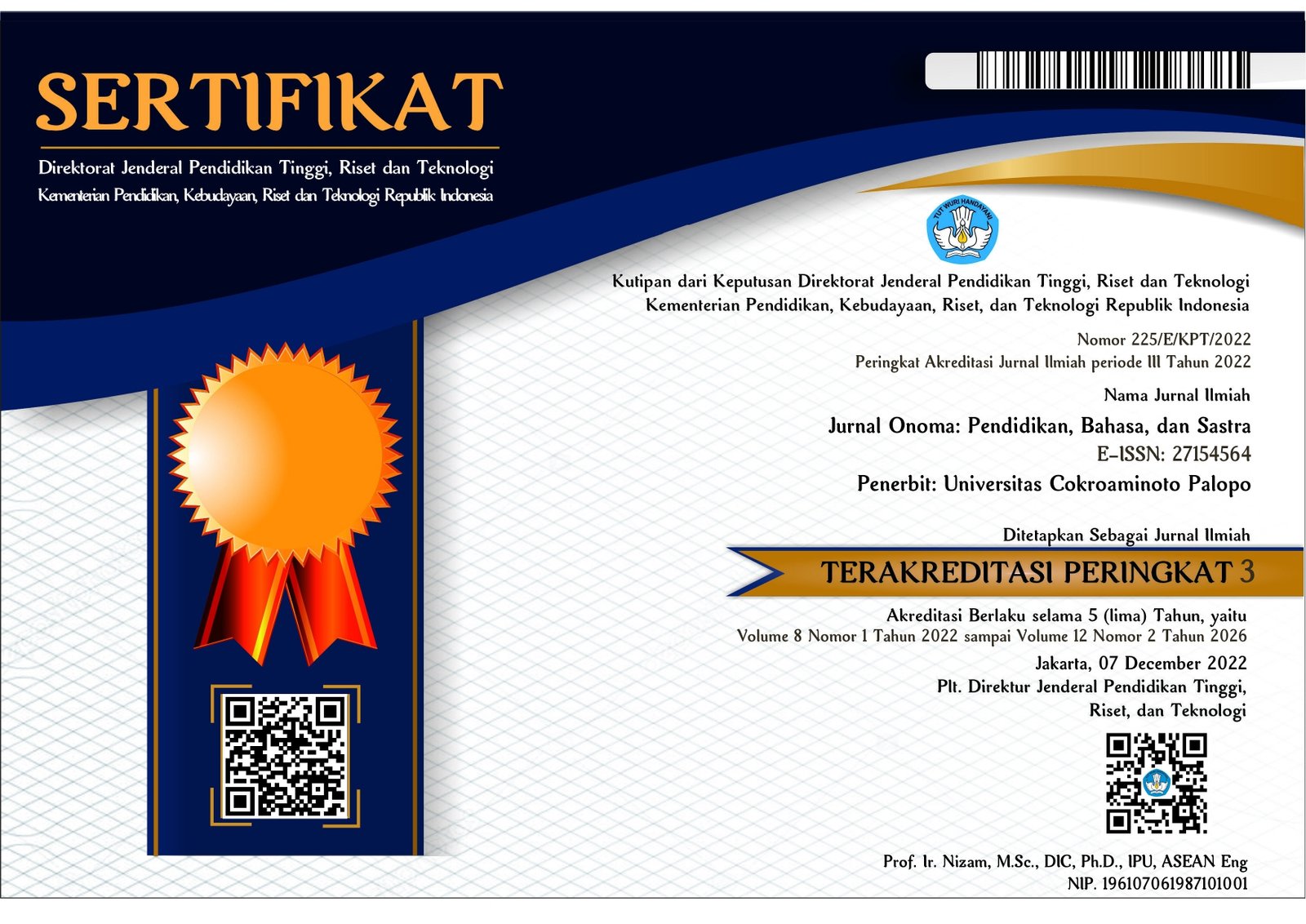Indoglish: Mencermati Fenomena Sosiolinguistik di Era Media Sosial Melalui Konten Facebook
Indoglish
https://doi.org/10.30605/onoma.v11i2.5494
Keywords:
Sosiolinguistik, Indoglish, Konten FBAbstract
Penelitian ini bertujuan untuk mendokumentasikan bentuk-bentuk Indoglish dari tingkat linguistik, mendeskripsikan proses terbentuknya Indoglish, serta menjelaskan alasan penggunaan Indoglish oleh pembuat konten Facebook dengan nama akun “Pita’slife”. Penelitian ini menggunakan pendekatan deskriptif kualitatif dan menyajikan hasilnya dalam bentuk uraian verbal. Data diperoleh dari konten video yang diunggah oleh akun “Pita’slife” dalam Facebook. Teknik pengumpulan data dilakukan melalui observasi dan pencatatan. Analisis data mencakup tiga tahapan, yaitu reduksi data, penyajian data, dan penarikan kesimpulan. Hasil penelitian menunjukkan terdapat 45 data Indoglish dalam konten FB Pita’slife yang dibatasi empat konten video. Klasifikasi data berdasarkan konsep Oktavia (2019), di mana Indoglish dapat dilihat dari dua unsur, yaitu unsur Indonesia dalam bahasa Inggris dan unsur bahasa Inggris dalam bahasa Indonesia. Berdasarkan data primer penelitian, alasan dibalik penggunaan Indoglish dalam konten FB “Pita’slife” yaitu: (1) menjaga koneksi dengan audiens lokal, (2) mempertahankan identitas budaya, (3) menarik perhatian audiens Indonesia dan memperluas jangkauan, serta (4) mempermudah komunikasi.
Downloads
References
Dahniar, A. & Sulistyawati, R. (2023). Analisis Campur Kode Pada Tiktok Podcast Kesel
Aje Dan Dampaknya Terhadap Eksistensi Berbahasa Anak Milenial: Kajian Sosiolinguistik. ENGGANG: Jurnal Pendidikan, Bahasa, Sastra, Seni, Dan Budaya, 3(2), 55–65. https://doi.org/10.37304/enggang.v3i2.8988 DOI: https://doi.org/10.37304/enggang.v3i2.8988
Hambali, A. (2023). Analisis Bahasa Indoglish Dalam Instagram Pada Generasi Z Di Kabupaten Sragen. Seminar Internasional Riksa Bahasa, 15-25.
Handayani, F. & Amelia, M. (2022). Indoglish As A Sociolinguistic Phenomenon: A Case Study At English Departments Ummy Solok. Journal of English Language Learning (JELL), 6 (1), 53-61. https://doi.org/10.31949/jell.v6i1.2448 DOI: https://doi.org/10.31949/jell.v6i1.2448
Khotimah, K., Pribadi, F., Mintowati, & Ahmadi, A. (2020). Indoglish in Social Media Platforms and Its Significance as a National Language Planning Material Study of Language Attitudes of Young Generation in the Digital Age. Proceedings of the International Joint Conference on Arts and Humanities (IJCAH), 491, 998-1007. Atlantis Press. https://doi.org/10.2991/assehr.k.201201.168 DOI: https://doi.org/10.2991/assehr.k.201201.168
Mahsun. (2017). Metode Penelitian Bahasa: Tahapan Strategi, Metode, dan Tekniknya. Rajawali Pers.
Oktavia, W. (2019). Eskalasi bahasa indoglish dalam ruang publik media sosial. Diglosia:Jurnal Kajian Bahasa, Sastra, dan Pengajarannya, 2(2), 83-92. https://doi.org/10.30872/diglosia.v2i2.20 DOI: https://doi.org/10.30872/diglosia.v2i2.20
Sedeng, N. & Indrawati, N. L. K. M. (2019). The Use of Indoglish in Faculty of Arts, Udayana University-Bali. Journal of A Sustainable GlobalSouth, 3 (1), 23-27. DOI: https://doi.org/10.24843/jsgs.2019.v03.i01.p04
Sudewi, N. K. P. N, Muhlisin, & Ardiyati, SM. (2023). Indoglish as A Sociolinguistic Phenomenon: The Power of Language In the 4.0 Era. JISHUM (Jurnal Ilmu Sosial dan Humaniora), 1 (3), 407-416. https://doi.org/10.57248/jishum.v1i3.93 DOI: https://doi.org/10.57248/jishum.v1i3.93
Sugiyono. (2014). Metode Penelitian Kuantitatif, Kualitatif, dan R&D. Bandung: Alfabeta.
Wijana, I. D. P. 2021. Pengantar Sosiolinguistik. Gadjah Mada University press.
Wijaya, A. D., & Bram, B. (2021). A Sociolinguistic Analysis Of Indoglish Phenomenon In South Jakarta. PROJECT (Professional Journal of English Education). 4 (4), 672-684. DOI: https://doi.org/10.22460/project.v4i4.p672-684
Downloads
Published
How to Cite
License
In submitting the manuscript to the journal, the authors certify that:
- They are authorized by their co-authors to enter into these arrangements.
- The work described has not been formally published before, except in the form of an abstract or as part of a published lecture, review, thesis, or overlay journal.
- That it is not under consideration for publication elsewhere,
- That its publication has been approved by all the author(s) and by the responsible authorities – tacitly or explicitly – of the institutes where the work has been carried out.
- They secure the right to reproduce any material that has already been published or copyrighted elsewhere.
- They agree to the following license and copyright agreement.
License and Copyright Agreement
Authors who publish with Onoma Journal: Education, Languages??, and Literature agree to the following terms:
- Authors retain copyright and grant the journal right of first publication with the work simultaneously licensed under Creative Commons Attribution License (CC BY 4.0) that allows others to share the work with an acknowledgment of the work's authorship and initial publication in this journal.
- Authors are able to enter into separate, additional contractual arrangements for the non-exclusive distribution of the journal's published version of the work (e.g., post it to an institutional repository or publish it in a book), with an acknowledgment of its initial publication in this journal.
- Authors are permitted and encouraged to post their work online (e.g., in institutional repositories or on their website) prior to and during the submission process, as it can lead to productive exchanges, as well as earlier and greater citation of published work.

















